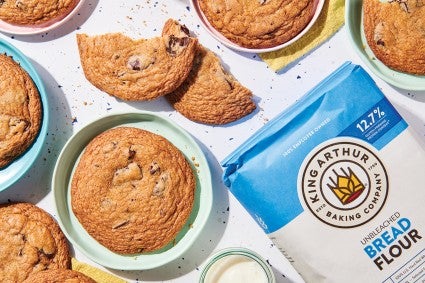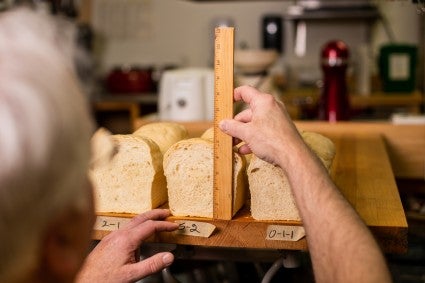


Many bakers simply assume that all flour is the same. But all flour isn’t created equal — from the wheat it’s milled from to how it’s processed to its protein content, flour varies in so many ways. At King Arthur, our mission is to offer the highest quality flour to help you bake your best. Here’s what that means.
Our wheat flours (with the exception of whole wheat), such as all-purpose flour, cake flour, and self-rising flour, are naturally aged after milling for around two to four weeks, during which time they slowly oxidize and whiten on their own. This is unbleached flour, and it’s how King Arthur makes all of our white flours.
Many other flour brands, however, use chemical treatments to manually speed up this process, including adding bleach and potassium bromate. The latter has particularly come under scrutiny as tests have indicated that it is carcinogenic in animals and probably in humans. (Learn more: Bleached vs. unbleached flour: What's the difference?)
In addition to containing no bleach, bromate, or artificial preservatives, all King Arthur flour is also third-party non-GMO certified.

Protein percentage is one of the most crucial variables in all-purpose flour and bread flour. It primarily refers to the two gluten-forming proteins found in flour, glutenin and gliadin. Because these proteins form gluten, then the more protein in the flour — i.e., the higher its protein content — the more gluten-forming potential that flour has. Another way to think about it: the higher the protein content, the “stronger” the flour. (Learn more: Protein percentage in flour: Why it matters.)
Protein percentage can have a huge impact on your baked goods, which is why it’s an important variable in baking. Unfortunately, some flour brands allow wide fluctuations in their protein content, so every time you use a new bag of flour, you’ll get slightly different results. King Arthur flour, however, is milled to the strictest specifications in the industry. We guarantee that the protein percentage that’s printed on the front of the bag will always match the flour inside of it.
That’s not the only factor in flour, though. We also set strict standards for variables like ash content, moisture levels, wheat quality, and more, and constantly test to ensure our flour is meeting these specifications. Baking with flour that has uniform standards will give you the best, most consistent results at home, so there’s no wasted time or ingredients — just lots of delicious baked goods.

We set the strictest standards in the industry for testing all of our signature flours. This includes extensive baker testing — because one of the most important elements of flour is that it bakes well! Our Research & Development team regularly performs bake tests with our flour to guarantee it’s maintaining our high standards and remains consistent.
Throughout the year, they double-check the flour from our partner mills to ensure every bag comes out just right. This includes a simple but highly effective test called flour slicking that involves hydrating flour to examine the quality of the grind, the color, the amount and shape of the bran, and how well the starch absorbs water.
They also perform a bake test. This involves making loaves of basic white sandwich bread to judge how well the flour performs in baking, evaluating performance like the height of the loaf, its crumb structure, smell, and of course, its taste. (Learn more about our baker testing: Meet Frank, King Arthur’s top flour cop.)
Farmers are the backbone of everything we do. Without farmers, there’s no wheat, and without wheat, there’s no flour. We’re committed to sourcing our wheat entirely from American farms and helping grow a strong, sustainable agricultural economy.
We also believe we have a responsibility to both the farmers we work with and to the planet. That’s why several of our flours — including our Golden Whole Wheat Flour and our Climate Blend Flour — are milled from wheat grown using regenerative practices. This type of agriculture seeks to restore, renew, and enhance natural resources through a range of practices that focus on healthy soils, ecosystems, and farming communities. It’s not just about sustaining our planet, but actively healing it — one bag of flour at a time.
Ultimately, every bag of King Arthur flour comes with a guarantee of quality and consistency. We’re here to ensure you do your best baking, and that starts with providing the best flour. What are you going to make with it?
Boost your flour IQ:


January 29, 2025 at 9:37am
I was curious about how long it takes on average from harvesting the wheat to getting the flour on the shelves. Do different flours take longer or shorter?
March 15, 2025 at 3:38pm
In reply to I was curious about how long… by David (not verified)
Hi David, this article does a good job of explaining what's involved with this process. You can read more about King Arthur's priorities when it comes to growing wheat in this section of our website.
December 18, 2024 at 5:09pm
Does King Arthur Flour contain soy?
February 1, 2025 at 3:45pm
In reply to Does King Arthur Flour… by Kathleen (not verified)
Hi Kathleen, we do not add soy to our flours. Happy Baking!
December 6, 2024 at 3:57pm
I would like to try your white whole wheat flour, but I am not sure I understand -- is it unbleached? I don't understand how whole wheat flour can be white. Thank you.
January 9, 2025 at 11:39am
In reply to I would like to try your… by Paul (not verified)
Hi Paul! Our white whole wheat flour, like the rest of our flours, is unbleached. This flour comes from the white wheat berry, as opposed to the red wheat berry, and is milled from the entire wheat berry (bran germ and endosperm). You might be familiar with our regular whole wheat flour which is from the red wheat berry. The white wheat berry allows for a slightly higher rise than the red wheat berry. Think of these two wheat berries as you would two different kinds of apples, same fruit but different flavor and properties. Happy baking!
November 28, 2024 at 7:38am
I couldn't find anything on website about products being glyphosate free. are they?
December 15, 2024 at 9:58am
In reply to I couldn't find anything on… by Gladys Vinca (not verified)
Hi Gladys Vinca, we do want to assure you that for all of our products, we start with our commitment to ensuring the highest quality possible. We partner with mills and farmers to produce flour that meets our high standards and specifications to ensure superior baking performance.
For non-organic wheat, glyphosate is federally approved for use by farmers. Any application must comply with its regulatory approval, and, if used, residual glyphosate levels in wheat should remain well below the federally mandated level.
We also offer a full line of certified 100% organic flours, where the use of glyphosate is prohibited. We offer our organic line to ensure that our customers have options to suit their individual needs. Our organic flour line is independently verified by QAI (Quality Assurance International) to ensure organic certification requirements are strictly followed.
September 29, 2024 at 9:48pm
I’ve heard some farmers kill their wheat with chemicals for scheduled harvesting. Do you avoid wheat with chemicals?
October 11, 2024 at 12:26pm
In reply to I’ve heard some farmers kill… by Charles Vono (not verified)
Hi Charles, we do want to assure you that for all of our products, we start with our commitment to ensuring the highest quality possible. We partner with mills and farmers to produce flour that meets our high standards and specifications to ensure superior baking performance. For non-organic wheat, glyphosate is federally approved for use by farmers. Any application must comply with its regulatory approval, and, if used, residual glyphosate levels in wheat should remain well below the federally mandated level for wheat of 30 parts per million. We also offer a full line of certified 100% organic flours, where the use of glyphosate is prohibited. We offer our organic line to ensure that our customers have options to suit their individual needs. Our organic flour line is independently verified by QAI (Quality Assurance International) to ensure organic certification requirements are strictly followed.
Pagination